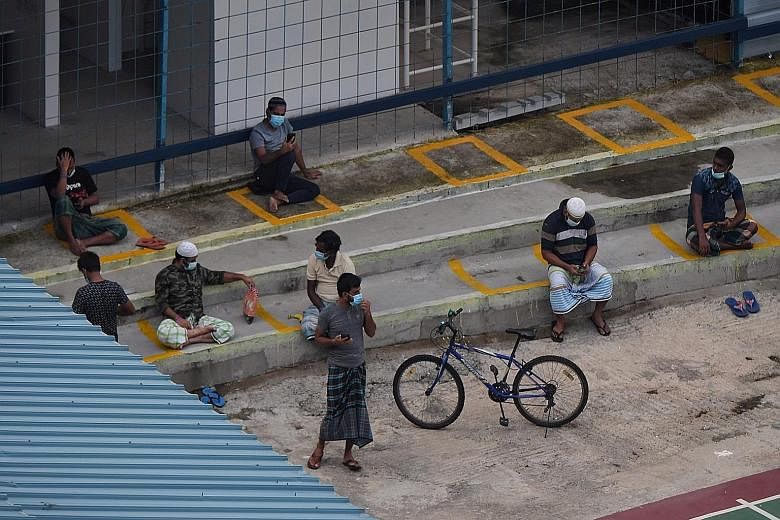Foreign workers staying in dormitories, their employers and dorm operators will have to comply with a slew of measures before the workers can resume work.
Dorm operators should also cooperate with employers to implement measures for workers to stay in dorms safely, said the Ministry of Manpower (MOM) yesterday.
These include tracking movements in and out of dorms, setting up barriers to prevent mixing of workers between blocks and levels, monitoring their health and setting up on-site isolation facilities.
Dorm operators must make these rules clear to residents and may "impose a small financial penalty for non-compliance", said the MOM.
It said workers will be allowed to leave the dorms only for work in phase one of the post-circuit breaker period. They must use designated transport provided by their employers and return to the dorms immediately after work.
They cannot leave the dorms on their rest days, and employers must ensure their workers have access to food and necessities, even if they are not eligible to resume work.
In phase two, workers will be allowed to run errands outside their dorms during staggered rest days and time slots. Rest days do not need to be staggered in phase one.
They can leave the dorms for up to two hours and travel to one of eight designated recreational centres via dedicated transport.
In phase three, rest days will continue to be staggered, but workers will be allowed to leave for longer periods and go to more locations.
The MOM said the first batch of dorms and dorm blocks that have been cleared will be announced this week. This refers to blocks or whole dorms where the residents are all either recovered Covid-19 patients or have tested negative.
But the residents will still have to remain in the dorms until additional steps, which the ministry expects will take about a week, are implemented.
Under the new measures, workers will have to report their health status, location and mobile numbers on an MOM app and also download the TraceTogether app.
The guidelines will be translated into the native languages of the workers and disseminated to them.
Employers have to confirm the addresses of each of their workers in the MOM's Online Foreign Worker Address Service and show proof of approval to resume work issued by relevant government agencies.
Operators of dorms of all sizes, including temporary living quarters, will be required to provide the ministry with an updated register of all their residents.
Dorm operators and employers will also have to work together to plan staggered pick-up and drop-off times for the workers.
The MOM stressed that each worker's address must be updated by the worker himself, his dormitory operator and his employer.
"If the worker's address as reported by the three parties does not tally, it has to be rectified before the worker can resume work," it said. "This is to ensure future contact tracing efforts are not hampered and the health and safety of other dormitory residents compromised."
The MOM also said it will work with the relevant sector agencies to ensure that all measures laid out in the advisories are properly implemented before workers are allowed to exit the dormitory for work. "Depending on actual implementation of the measures, MOM may grant approval for specific cleared blocks or entire cleared dormitories."
Some dorm operators and employers told The Sunday Times that they have been working with the authorities to prepare for their workers to resume work, so the new measures do not come as a surprise.
S11 Dormitories managing director Johnathan Cheah said his company's dormitories have had biometric entry and exit systems and sick bay beds since their inception.
The company operates PPT Lodge 1B, also known as the S11 Dormitory @ Punggol, which houses 14,000 workers, and Changi Lodge 2, which houses another 4,000.
In recent months, the dorms have introduced inter-floor and inter-block restrictions to segregate their residents and converted spaces such as a games rooms and multi-purpose halls into sick bays, Mr Cheah said.
A spokesman for Centurion, which operates the five Westlite dorms, said it has enough "clean units" to house 1,200 healthy workers, and will expand this capacity as more recovered residents return.
It has also implemented its own measures such as a coloured wristband system for identifying residents at different stages of testing, and providing contactless channels for daily needs like grocery orders and remittance services through its own app, the spokesman added.
Mr Hooi Yu Koh, chairman and chief executive of construction company Kori Holdings, said the Singapore Contractors Association Limited (Scal) has been working with the authorities to come up with realistic measures to allow workers to return to work safely. Scal has kept contractors updated on its discussions over the last few weeks, Mr Hooi said.
His company employs about 200 foreign workers who are mostly involved in underground works such as tunnelling for MRT construction and sewerage projects.
Mr Hooi said the measures to control the movement of workers and ensure they do not mix with workers from another company or dorm while on-site, as well as staggered rest days, will inevitably result in lower productivity.
"It will be difficult to make up for manpower shortage when workers are on medical leave, for example, as we will not have the flexibility to move workers around to do multiple tasks," he said.
But he added that this is the price that must be paid to ensure work can resume safely and gradually.


